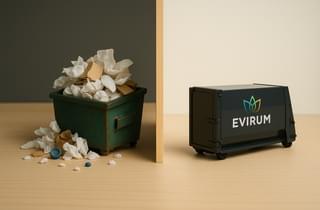5 Signs it's time to invest in a waste compactor (Beyond just high volume)
June 13, 2025
Most businesses assume compactors are luxuries reserved for sprawling factories or distribution giants. In reality, the fastest paybacks are happening at the mid-size sites where waste still dictates the day. If you’ve ever shelled out for a last-minute pickup or watched teammates crush cardboard with a forklift, you already know those “little” interruptions drain cash and momentum every shift.
Waste shouldn’t bully your schedule, bleed labor hours, or ruin first impressions. The five warning signs below reveal when disposal has quietly outgrown your current setup; and why a compactor turns that daily firefight into a silent, clockwork expense instead of a profit leak.

1. Waste dictates your schedule, not the other way around
Imagine it's Tuesday morning and your bin is already spilling over. You call an emergency pickup only to discover you're paying double, sometimes triple, the usual rate. Or you postpone critical tasks while you and your team compress garbage by foot or forklift, scrambling to fit everything back into its container. When you're forced into "waste triage" three or four times a month, you're not just losing money on surprise fees; you're surrendering control of your calendar.
A compactor transforms that cycle. By crushing six, eight, even ten times the volume of loose waste into a fraction of the space, you can stretch your hauls from twice-weekly to once every two weeks or more. No more frantic calls. No more emergency surcharges. You set the pickup schedule and your operations run on your terms.
2. Your team spends hours playing tetris with trash
If your staff spends more than ten minutes a day shoving, flattening, and restacking bins, that adds up to well over sixty lost hours each year - more than a week of full-time labour wasted on waste management. Every minute your kitchen crew wrestles with overflowing carts is time not spent crafting dishes. Every moment your retail associates spend breaking down cardboard is time away from customers.
Compactors automate the compression work. Load your waste, close the door, and walk away. The machine does the heavy lifting. Your team focuses on core tasks, and you recoup those lost hours as productive labour.
3. Your loading zone feels like a staging area
A row of overflowing carts, stray cardboard drifting in the wind, and sticky residue tracked through your reception area. It's unsightly and unprofessional. Clients and suppliers form judgments based on the first thing they see: a chaotic waste yard tells them you're disorganized everywhere.
More than that, uncovered trash attracts pests. Rodents and insects view your bins as an all-you-can-eat buffet, then wander into storage rooms, kitchens, and offices. Health-code violations and reputational damage often follow.
An enclosed compactor seals off your refuse, contains odors, and delivers a clean, streamlined profile. Instead of a hodge-podge of carts, you have a single, purpose-built unit that reflects the professionalism you bring to every other aspect of your business.
4. You're paying to haul air
When haulers grab a dumpster that’s only 60% full, you’re funding 40% pure air. At $150 per pull, for example, that works out to about $250 for every true ton of trash because 40% of the space is empty. Multiply that by 100+ pickups a year and you’re tossing thousands of dollars straight into the bin alongside the cardboard.
A compactor flips that math. With 90–95% container utilization, each haul carries nearly twice the payload, slashing per-ton fees, cutting pickups in half, and letting you schedule service on your terms - not the dumpster’s.
5. Compliance and safety keep you up at night
Overflowing bins and loose debris are safety hazards and potential violations on top of being unsightly. Employees climbing precarious stacks of refuse to shove down more trash, slippery floors stained by leaks, and rodents scurrying among the dumpsters are liabilities waiting to happen. Municipal bylaws frequently mandate proper containment and site cleanliness; fines and forced cleanup orders can cripple your budget.
Compactors offer secure, lockable containment that meets or exceeds most local regulations. Their ergonomic design eliminates the need for manual crushing or bin-climbing. With a compactor on site, you reduce safety risks, ensure consistent compliance, and sleep more soundly knowing your facility is both professional and protected.
The hard ROI
When you tally your hidden costs - emergency-haul premiums, lost staff hours, pest control, potential fines, and even the cost of a tarnished reputation - you often find that a compactor's upfront investment pays for itself within 18–36 months. But the real payoff goes deeper: you regain control of your operations, free your team from menial tasks, and present a cleaner, safer, more professional face to customers and regulators alike.
Finding the perfect fit
Compactor style | Best for | Why it matters |
Stationary compactor + roll-off container | Dry waste, recyclables, large cardboard streams | The compactor bolts to the pad and stays put while the container is swapped out. Ideal when leaks aren’t a concern and floor space is plentiful. |
Container-integrated or vertical compactor | Sites with tight docks or limited frontage | The compactor and container are a single unit, often loaded from the top. A smaller footprint lets you tuck it against a wall or under a canopy without blocking traffic lanes. |
Monoblock (sealed) compactor | Food scraps, organics, wet or “smelly” waste | Welded, leak-proof construction keeps liquids contained and odors locked down: perfect for groceries, hospitality, or any operation moving toward composting mandates. |
Take back control today
Overflowing bins steal hours, space, and money every single day. A compactor flips that script: once it’s in place, pickups shrink to a predictable cadence, safety risks disappear, and your loading dock looks as organized as the rest of your operation. Choose the model that fits your stream, set the haul schedule to match, and watch the chaos disappear.
Ready for waste to manage itself? Let’s map out the right compactor that removes trash bottlenecks before they even form.
Get a free consultation
Not sure what services you need for your business? We can help. Contact Evirum today for a personalized waste management plan tailored to your specific requirements.
